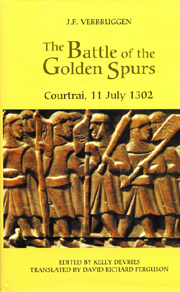 The Battle of the Golden Spurs (Courtrai, 11 July 1302)
The Battle of the Golden Spurs (Courtrai, 11 July 1302) Book contents
- Frontmatter
- Contents
- List of Illustrations
- General Editor's Preface
- Editor's Introduction to the 2002 edition
- Foreword to the 1952 edition
- Acknowledgements (to the 1952 edition)
- Preface: ‘An almost impossible event …’
- Introduction
- Part One Historiography and the Study of the Sources
- Part Two Historical Overview of the 1302 Campaign
- 3 The Terrain at Courtrai
- 4 The Two Armies
- 5 From the Bruges Matins to the Battle of the Spurs for freedom, equality and fraternity
- 6 11 July 1302
- General Conclusion
- Bibliography
- Index
5 - From the Bruges Matins to the Battle of the Spurs for freedom, equality and fraternity
from Part Two - Historical Overview of the 1302 Campaign
Published online by Cambridge University Press: 12 September 2012
- Frontmatter
- Contents
- List of Illustrations
- General Editor's Preface
- Editor's Introduction to the 2002 edition
- Foreword to the 1952 edition
- Acknowledgements (to the 1952 edition)
- Preface: ‘An almost impossible event …’
- Introduction
- Part One Historiography and the Study of the Sources
- Part Two Historical Overview of the 1302 Campaign
- 3 The Terrain at Courtrai
- 4 The Two Armies
- 5 From the Bruges Matins to the Battle of the Spurs for freedom, equality and fraternity
- 6 11 July 1302
- General Conclusion
- Bibliography
- Index
Summary
An unbridgeable chasm arose between the King of France and the Flemish town of Bruges in the early hours of 18 May 1302, known as the Bruges Friday. The blood of 120 noblemen and royal foot-soldiers destroyed all hope of peaceful settlement to the conflict that had broken out.
Simple weavers, fullers and other artisans suddenly became the powerful rulers of the richest town in Flanders. They were aware of the gravity of the massacre committed and of the crime of lèse majesté that called for revenge: it was clear to them that they could no longer avoid responsibility, and that the struggle would have to be waged to its very end. A victory, or terrible death as punishment, was for their leaders, as well as for a large number of the rebels, the only choice presented to them. They fought for classic ideals of the highest value through the ages, an inspiration to countless men of supreme sacrifice: equality, fraternity and liberty. From the beginning of the protest in Bruges, the members of the guilds gathered under the banner of Pieter de Coninc, the representative of the guild with the most members. The artisans of the wool industry – weavers, fullers, and shearers – wanted to become the equals of the members of rich trades, like brewers, sellers of wool cloth or butchers, and the equals of the patricians who were the masters of the town. The weavers wanted to buy their wool and to sell the cloth they had made.
- Type
- Chapter
- Information
- The Battle of the Golden Spurs (Courtrai, 11 July 1302)A Contribution to the History of Flanders' War of Liberation, 1297–1305, pp. 211 - 221Publisher: Boydell & BrewerPrint publication year: 2001


